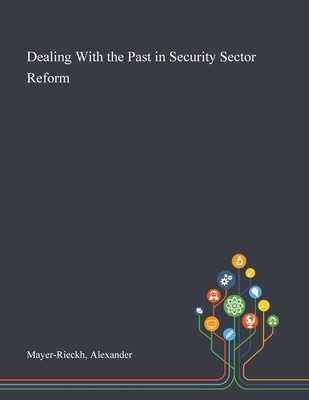
- We will send in 10–14 business days.
- Author: Alexander Mayer-Rieckh
- Publisher: Saint Philip Street Press
- ISBN-10: 1013292421
- ISBN-13: 9781013292422
- Format: 21.6 x 27.9 x 0.4 cm, softcover
- Language: English
- SAVE -10% with code: EXTRA
Dealing With the Past in Security Sector Reform (e-book) (used book) | bookbook.eu
Reviews
Description
Security sector reform (SSR) and transitional justice processes often occur alongside each other in societies emerging from conflict or authoritarian rule, involve many of the same actors, are supported by some of the same partner countries and impact on each other. Yet the relationship between SSR and transitional justice, or â dealing with the pastâ (DwP) as it is also called, remains underexplored and is often marked by ignorance and resistance. While SSR and transitional justice processes can get into each otherâ s way, this paper argues that SSR and DwP are intrinsically linked and can complement each other. SSR can make for better transitional justice and vice versa. Transitional justice needs SSR to prevent a recurrence of abuses, an essential element of justice. SSR can learn from transitional justice not only that it is better to deal with rather than ignore an abusive past but also how to address an abusive legacy in the security sector. The validity of these assumptions is tested in two case studies: the police reform process in Bosnia and Herzegovina after 1995 and the SSR process in Nepal after 2006.
This work was published by Saint Philip Street Press pursuant to a Creative Commons license permitting commercial use. All rights not granted by the work's license are retained by the author or authors.EXTRA 10 % discount with code: EXTRA
The promotion ends in 19d.05:55:08
The discount code is valid when purchasing from 10 €. Discounts do not stack.
- Author: Alexander Mayer-Rieckh
- Publisher: Saint Philip Street Press
- ISBN-10: 1013292421
- ISBN-13: 9781013292422
- Format: 21.6 x 27.9 x 0.4 cm, softcover
- Language: English English
Security sector reform (SSR) and transitional justice processes often occur alongside each other in societies emerging from conflict or authoritarian rule, involve many of the same actors, are supported by some of the same partner countries and impact on each other. Yet the relationship between SSR and transitional justice, or â dealing with the pastâ (DwP) as it is also called, remains underexplored and is often marked by ignorance and resistance. While SSR and transitional justice processes can get into each otherâ s way, this paper argues that SSR and DwP are intrinsically linked and can complement each other. SSR can make for better transitional justice and vice versa. Transitional justice needs SSR to prevent a recurrence of abuses, an essential element of justice. SSR can learn from transitional justice not only that it is better to deal with rather than ignore an abusive past but also how to address an abusive legacy in the security sector. The validity of these assumptions is tested in two case studies: the police reform process in Bosnia and Herzegovina after 1995 and the SSR process in Nepal after 2006.
This work was published by Saint Philip Street Press pursuant to a Creative Commons license permitting commercial use. All rights not granted by the work's license are retained by the author or authors.

Reviews